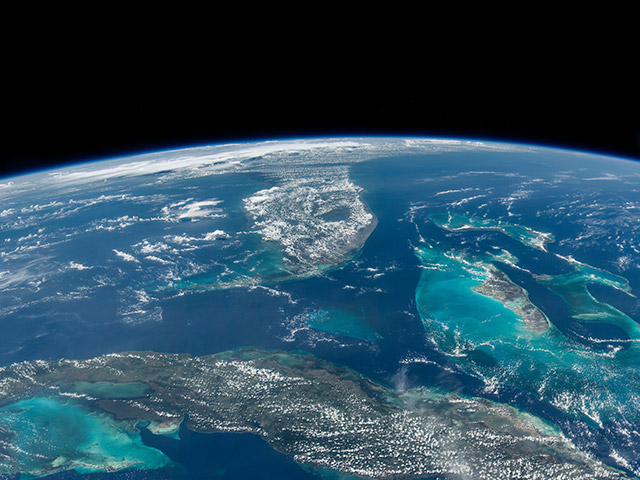
- Details
- By Levi Rickert
Opinion. This week is celebrated as Earth Week. On Monday, April 22, Americans will commemorate the 54th anniversary of the first Earth Day back in 1970. The day was established as a community-based effort to bring awareness to environmental issues.
[Editor's Note: This opinion was originally publihsed on April 22, 2023. It has been updated to refelct changes in dates.]
Even with all of the efforts every year, Mother Earth is suffering.
Last year, I moderated a panel discussion at the Reservation Economic Summit (RES) in Las Vegas that was organized by the Department of Energy’s Tribal Energy Loan Guarantee Program. During the discussion, one of the panelists, Lacey Horn (Cherokee), the former treasurer of the Cherokee Nation made a statement about climate change that has stayed with me since.
“We are also experiencing massive climate changes - and experts are saying it’s too late to stop climate change. We had a chance 30 years ago, but today it’s about building our future by adapting,” Lacey said.
Lacey’s statement was very consistent with a stern warning scientists delivered on climate change issued back on March 20, 2023 by the Intergovernmental Panel on Climate Change (IPCC) in the AR6 Synthesis Report, which reads: “Climate change is a threat to human well-being and planetary health …There is a rapidly closing window of opportunity to secure a liveable and sustainable future for all.”
UN Secretary General António Guterres called the report “a clarion call to massively fast-track climate efforts by every country and every sector and on every timeframe. Our world needs climate action on all fronts: everything, everywhere, all at once.”
The report provides a stark overview of the devastation already being felt around the globe through high levels of greenhouse gas emissions. The effects have been devastating on Mother Earth. Climate change has caused extreme weather that has led to deaths due to intense heat waves in several parts of Earth. Millions of lives and homes have been destroyed in droughts and floods and “increasingly irreversible losses'' in vital ecosystems.
For some Native Americans, global warming and climate change have been on their agenda for decades. Faithkeeper of the Turtle Clan of the Onondaga Nation Oren Lyons has been telling audiences that it is time to pay attention to the warning signs Mother Earth is trying to convey through catastrophic acts of nature. Lyons goes as far to say that the sudden wind shifts are fulfillment of Indigenous prophecies that date back generations.
“Science can point out dangers, but science cannot turn the direction of minds and hearts. That is the province of spiritual powers within and without our very beginnings,” Lyons said.
In a June 27, 2021 article entitled “Dispossessed, Again: Climate Change Hits Native Americans Especially Hard,” The New York Times writes: “From Alaska to Florida, Native Americans are facing severe climate challenges, the newest threat in a history marked by centuries of distress and dislocation. While other communities struggle on a warming planet, Native tribes are experiencing an environmental peril exacerbated by policies — first imposed by white settlers and later the United States government — that forced them onto the country’s least desirable lands.
“And now, climate change is quickly making that marginal land uninhabitable. The first Americans face the loss of home once again.”
Horn’s statement came back to me during Native News Online's Native Bidaské show as Jenna Kunze and I interviewed National Congress of American Indians President Fawn Sharp (Quinault). I asked her if we are too late to address climate change. She smiled and said, “No.”
“Anytime that thought even enters my mind, and it’s taken a lot for me over the years to resist the temptation to become apathetic and I trained my spirit not to go there because it’s unthinkable if you even toyed with the idea that we might be at a point we can’t give up hope,” Sharp said.
Tribal nations, she said, need to step up with Indigenous knowledge to help curtail the devastation of climate change. She mentioned the traditional ways tribes have used to burn forests in order to control growth that lead to massive forest fires.
“It’s up to tribal nations to really educate people about the root solution to this challenge. We need to return and align with traditional teachings that we have. We have to respect the earth,” Sharp continued.
During this Earth Week—and throughout the year—we must remember to respect Mother Earth. The earth is not ours, it belongs to future generations.
Note: Fawn Sharp is no longer the president of NCAI. She was term-limited.
Thayék gde nwéndëmen - We are all related.
More Stories Like This
Disrupting Poverty Through OpportunityMarmot Day (Ground Hog Day) and the (Lack of) Law
Sanctuary Cities Under Siege: When Federal Power Becomes a Weapon Against the People
Denmark's Genocidal Practices in Greenland
Cherokee Nation Stands Against Predatory Lending
Help us defend tribal sovereignty.
At Native News Online, our mission is rooted in telling the stories that strengthen sovereignty and uplift Indigenous voices — not just at year’s end, but every single day.
Because of your generosity last year, we were able to keep our reporters on the ground in tribal communities, at national gatherings and in the halls of Congress — covering the issues that matter most to Indian Country: sovereignty, culture, education, health and economic opportunity.
That support sustained us through a tough year in 2025. Now, as we look to the year ahead, we need your help right now to ensure warrior journalism remains strong — reporting that defends tribal sovereignty, amplifies Native truth, and holds power accountable.
 The stakes couldn't be higher. Your support keeps Native voices heard, Native stories told and Native sovereignty defended.
The stakes couldn't be higher. Your support keeps Native voices heard, Native stories told and Native sovereignty defended.
Stand with Warrior Journalism today.
Levi Rickert (Potawatomi), Editor & Publisher


